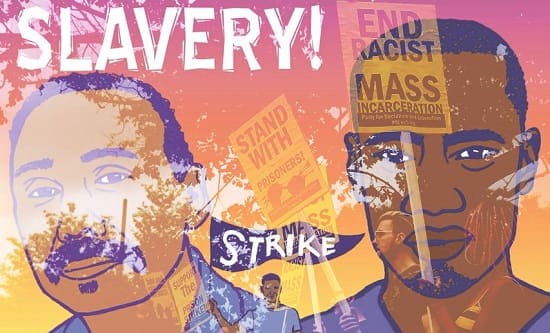
Between 21 August and 9 September 2018, US prisoners in at least 16 states staged work strikes, boycotts, hunger strikes and other protests in a co-ordinated action to highlight a set of agreed demands. The protest was highly politicised, as reflected in its start and end dates: the 47th anniversaries of the murder of black revolutionary prisoner George Jackson by prison guards in San Quentin, California, and the uprising 19 days later at Attica prison in New York state. Nicki Jameson reports.
The US prison system is the biggest in the world, with some 2.3 million people behind bars, and organising across it is a mammoth task. Learning from a similar co-ordinated protest in 2016, the prisoners and their supporters were well organised to ensure the message was diffused as widely as possible, both in the US and internationally, despite the predictable lack of any significant mainstream media coverage.
Although the 2016 protest focused primarily on the use of inmate labour by private companies and ‘prison slavery’, on this occasion this was only one of the demands. The full list of ‘NATIONAL DEMANDS of the men and women in federal, immigration, and state prisons’ was set out as follows:
- Immediate improvements to the conditions of prisons and prison policies that recognize the humanity of imprisoned men and women.
- An immediate end to prison slavery. All persons imprisoned in any place of detention under United States jurisdiction must be paid the prevailing wage in their state or territory for their labor.
- The Prison Litigation Reform Act must be rescinded, allowing imprisoned humans a proper channel to address grievances and violations of their rights.
- The Truth in Sentencing Act and the Sentencing Reform Act must be rescinded so that imprisoned humans have a possibility of rehabilitation and parole. No human shall be sentenced to Death by Incarceration or serve any sentence without the possibility of parole.
- An immediate end to the racial overcharging, over-sentencing, and parole denials of Black and brown humans. Black humans shall no longer be denied parole because the victim of the crime was white, which is a particular problem in southern states.
- An immediate end to racist gang enhancement laws targeting Black and brown humans.
- No imprisoned human shall be denied access to rehabilitation programs at their place of detention because of their label as a violent offender.
- State prisons must be funded specifically to offer more rehabilitation services.
- Pell grants [which fund low-income higher education students] must be reinstated in all US states and territories.
- The voting rights of all confined citizens serving prison sentences, pretrial detainees, and so-called ‘ex-felons’ must be counted. Representation is demanded. All voices count!
The final demand regarding voting rights is significant. In Britain, despite it having been declared contrary to the European Convention on Human Rights on several occasions, the government has consistently refused to allow convicted prisoners to vote in elections; however there is no ban on released prisoners voting. In all but two of the 50 US states serving prisoners are barred from voting, but only 14 states automatically remove this bar on release. The remainder have varying arrangements, from restoration of voting rights on completion of parole and probation to a lifetime bar removable only by individual petition to the state governor, a clemency board or a court. This effectively disenfranchises a significant – and predominantly black – section of society and in states such as Florida is considered by many commentators to have had a direct effect on the outcome of elections.
Protest actions in support of the ten demands took place in California, Florida, Georgia, Indiana, Kentucky, Maryland, Michigan, Missouri, New Mexico, North and South Carolina, New York, Ohio, Texas, Virginia and Washington, as well as in Nova Scotia, Canada. The Washington protest was staged by 200 immigration detainees at the Northwest Detention Center run by Immigration and Customs Enforcement (ICE) in Tacoma. They issued a statement on 20 August, saying:
‘We are taking part in a hunger strike nationwide demanding change and closure of these detention centers, we are acting with solidarity for all those people who are being detained wrongfully, and stand together to help support all those women who have been separated from their children, and to stop all the family separations happening today, for a lot of us are also being separated and we have US citizen children.’
Political prisoners belonging to the Popular Front for the Liberation of Palestine, held captive in Israeli gaols, issued a strong statement of solidarity with the US prisoners, describing how they were ‘fighting exploitation, racism and capitalism from within the heart of imperialist prisons’, sending a ‘special revolutionary salute to the imprisoned strugglers of the Black Liberation Movement and other liberation movements, including Mumia Abu-Jamal, whose consistent internationalism and principled struggle is known and resonates around the world’, demanding ‘the freedom of these freedom fighters in US jails, from Leonard Peltier to Mutulu Shakur’ and concluding: ‘We know from our experience that it is through struggle and confrontation that true freedom can be realized.’
Although 9 September, the anniversary of the Attica rebellion, was the official end of the planned protest, many prisoners have continued to take action. Updates on these ongoing protests, on retaliation by the prison authorities against participants and on actions which supporters can take in solidarity with the continuing struggle of US prisoners can be found on the website of the Incarcerated Workers Organizing Committee (https://incarceratedworkers.org) and the Facebook page of Jailhouse Lawyers Speak (www.facebook.com/BlkJailhouselawyer)
Fight Racism! Fight Imperialism! 266 October/November 2018




